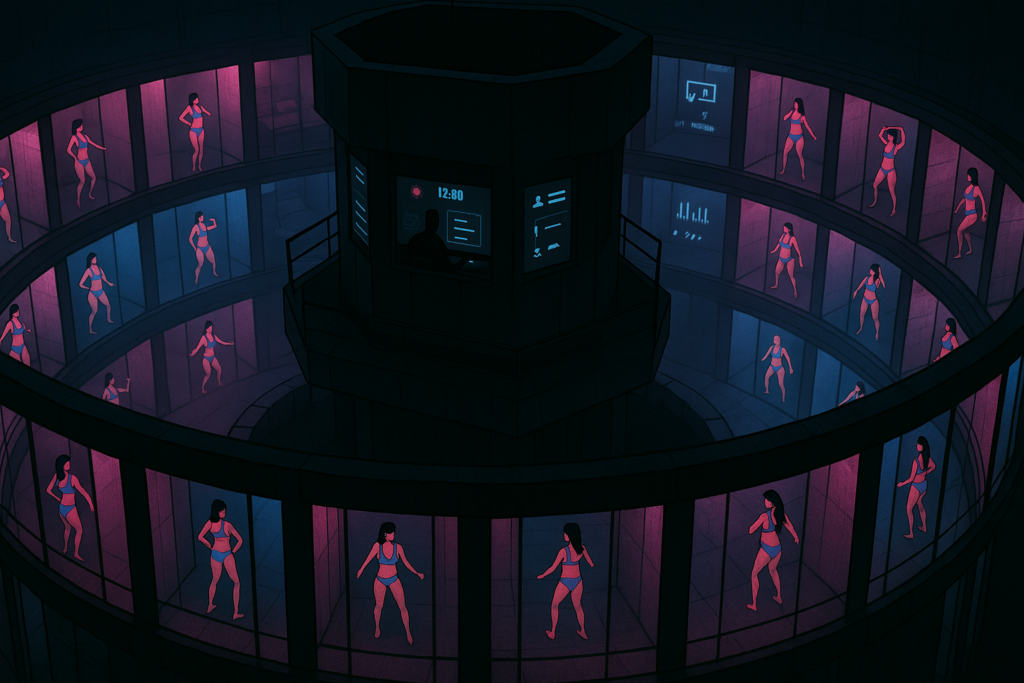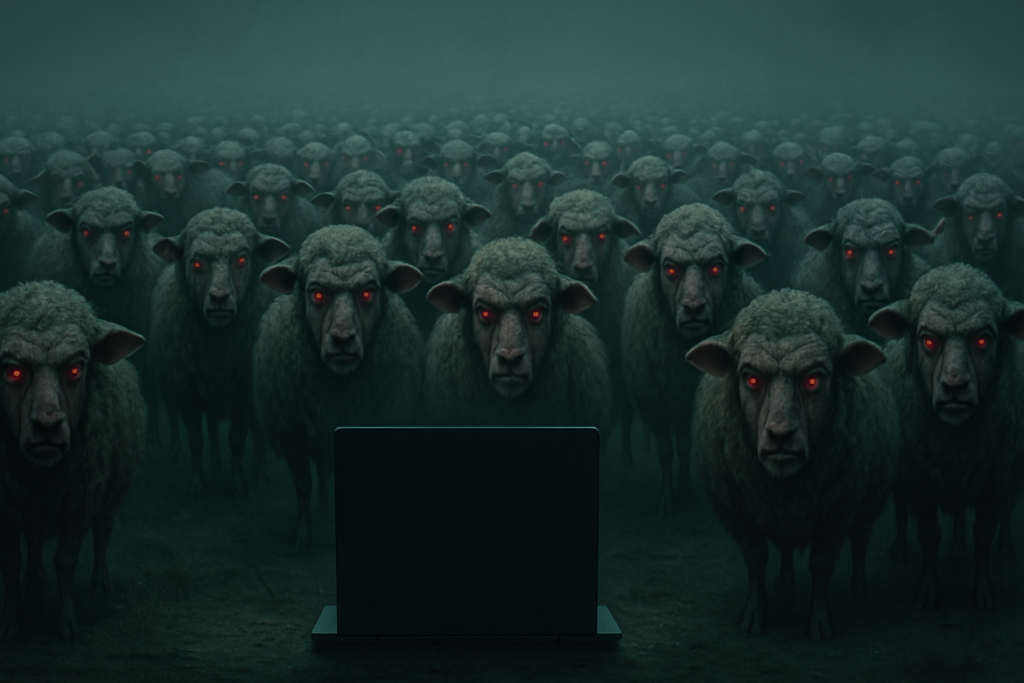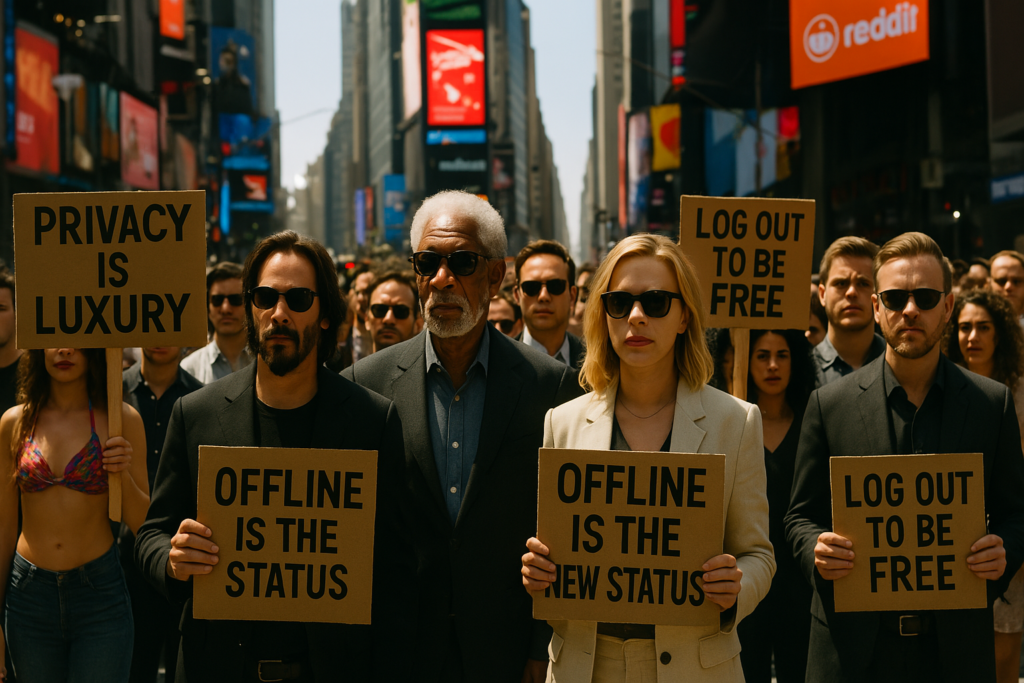Published on March 31, 2025 • By Andrea Labate
📝 OnlyFans is more than just a platform: it’s a mirror reflecting the paradoxes of our digital age. A fusion of empowerment and exploitation, intimacy and commodification, its rise forces us to rethink visibility, morality, and the very nature of human connection. Through the lenses of Baudrillard, Foucault, McLuhan, and Nietzsche, this article dissects the evolution of OnlyFans. Is this the ultimate form of digital liberation, or just another hyper-capitalist spectacle? Read on to find out.
- Table of Contents
Introduction
OnlyFans – a simple subscription website turned cultural phenomenon – has rapidly become a mirror for our society’s desires and contradictions. Born as a platform for creators to monetize content directly, it evolved into something of a Black Mirror-episode-in-progress: a space where intimacy is commodified, privacy is performative, and morality is up for debate. In the process, it forces us to ask uncomfortable questions: What are the ethical codes (the “deontology”) of a world where everything, even our most private moments, can be bought and sold? Is it empowerment, exploitation, or a dizzying mix of both? The tone of this inquiry must be as sharp as a knife – intelligent, critical, and laced with dark humor – because addressing OnlyFans is akin to staring into a cracked mirror reflecting both our society’s liberation and its anxieties. As we shall see, thinkers like Jean Baudrillard, Michel Foucault, Marshall McLuhan, and Friedrich Nietzsche (among others) provide a provocative lens through which to examine this phenomenon. Their ideas, once abstract, take on flesh (quite literally) in the age of OnlyFans.

Before diving into the depths of the topic, let’s briefly strip down OnlyFans to its essentials – its origins, its meteoric evolution, and the possible futures it foreshadows. Along the way, I hope I can make you grasp the critical (and at times darkly comic) insights into this very 21st-century spectacle.
Origins: From Kitchen Table to Cultural Earthquake
Every revolutionary platform has an origin story. For OnlyFans, it starts in 2016 at a kitchen table in suburban London. A young British entrepreneur, Tim Stokely, convinced his father to lend him £10,000 to launch a new content platform (one can almost imagine the pitch: *“Dad, I promise this isn’t another one of my crazy ideas…”—*it was). With that modest loan and a bit of tech, OnlyFans was born. The original idea was straightforward: allow creators – of any kind – to directly monetize their content and interactions with fans. In other words, cut out the middleman so that a fitness coach, a musician, or an artist could earn from their online followers. It was a vision in line with the growing creator economy of the 2010s, empowering individuals to profit from their personal brand.
However, as often happens in late capitalism, a platform’s users can redefine its purpose in unexpected ways. In the case of OnlyFans, it wasn’t long before adult entertainers and sex workers recognized the site’s potential as a safe, direct-to-consumer outlet for their content. Mainstream social media was (and is) rife with censorship and moral guidelines, but here was a subscription service where they could post nude or explicit material to paying subscribers without corporate overlords prying – essentially, Patreon without the puritanism. Initially, OnlyFans actually tried to deter explicit pornography – an ironic twist many forget. The platform banned sexually explicit content at first, aiming to attract traditional influencers and celebrities. But by 2017, market demand spoke louder than morality: OnlyFans quietly lifted the ban on pornographic content.
The floodgates opened, and a new era of self-produced adult content came rushing in.

From a technological viewpoint, none of this was groundbreaking – paywalls and private content feeds already existed. Yet the cultural timing was perfect. In the wake of Instagram’s curated lifestyles and YouTube’s monetization struggles, OnlyFans offered something different: authenticity intertwined with eros. It catered to a primal market with a personal touch. It’s as if the platform answered an unspoken question: what if anyone could be a cam star, and what if voyeurism could be packaged as a monthly subscription? As one might quip with sharp irony, the oldest profession met the newest technology, and they hit it off.
There is a dark humor in how banal the origin of this radical shift really was – just a dad’s small loan and some basic web infrastructure. It underscores a point that Marshall McLuhan famously made: “The medium is the message.” In other words, the platform (the medium) itself, not just the content, fundamentally shapes the social outcome. OnlyFans’ design – subscription-based, pay-to-see, creator-controlled – was the message that enabled its cultural impact. A platform originally intended for fitness tips and music videos became, through its structure, a new kind of adult industry. I’m sure McLuhan would smirk at this: a clear case where the channel determined the content, not the other way around. The fact that a website framework (profile, pay button, DM for tips) could spark a sexual revolution is a very 21st-century twist on McLuhan’s insight that the form of media, more than its specific subject matter, molds our society.
Evolution: Hyperreality, Hype, and the Panopticon of Pleasure
Once the word got out that real money could be made by selling homemade intimacy, OnlyFans’ growth exploded. By the late 2010s and into the early 2020s, millions flocked to the site – both creators and subscribers. The timing of its ascent intersected tragically (or opportunely) with the COVID-19 pandemic. Lockdowns meant people were stuck at home, either out of work or in need of novel entertainment. OnlyFans usage skyrocketed during the pandemic, reaching over 220 million users by 2023. For some, it was an economic lifeline: laid-off service workers or struggling artists could earn income by sharing racy photos or live streams. For others, it became a substitute for in-person dating and strip clubs – a digital fix for loneliness and boredom. In the grand tradition of technology, a tool can be both salvation and vice depending on how you use it.
Jean Baudrillard, the French sociologist known for dissecting our age of simulacra, would have a field day with OnlyFans. He argued that modern society has slipped into hyperreality – where simulations of reality become more real to us than reality itself. OnlyFans is a prime example: it offers carefully crafted simulations of intimacy and connection. The creators simulate a girlfriend experience or a personalized erotic performance for each subscriber, complete with direct messages that mimic genuine affection or friendship. It’s an economy of manufactured intimacy. In Baudrillard’s terms, it is “the generation by models of a real without origin or reality: a hyperreal.”
Subscribers pay for an illusion that feels more vivid and responsive than traditional porn (which is impersonal and one-way). On OnlyFans, the performer greets you by name, remembers your birthday, perhaps listens to your confessions – all for a price. It’s more real than real, a fantasy that blurs into reality because money can buy a form of attention that, in the offline world, might only be found in genuine relationships. The lines between authentic affection and paid performance evaporate in this hyperreal fog. Ironically, while the content is often literally naked, what you see is not exactly truth but a performance calibrated to your desires – a personalized simulacrum of love and lust.
The spectacle doesn’t stop at the simulation of intimacy. OnlyFans also exemplifies what Baudrillard might call the desert of the real. In a world where real human connection can be scarce or unsatisfying, the platform provides an oasis of endless, on-demand validation – a marketplace of desire that can feel more fulfilling than the mundane reality outside the screen. Some subscribers lose themselves in this oasis, investing small fortunes in their favorite creators, as if trying to fill a void. In a darkly comic sense, we might say that for some lonely souls the “real” world has become just a place to eat, sleep, and recharge devices, while the meaningful life happens in OnlyFans chats and streams. It’s hyperreality on steroids: the simulation eclipses the original to the point that the avatar becomes preferable to the flesh-and-blood person.
Where there is power and money, there is also surveillance and control – though in this case, the dynamics are novel. Here we should invite Michel Foucault into the conversation. Foucault famously analyzed modern society’s tendency to internalize the gaze of power, using the metaphor of Bentham’s Panopticon – a prison design where inmates are visible at all times to an unseen observer. “Visibility is a trap,” Foucault wrote, capturing how being constantly watched induces self-discipline. On OnlyFans, who is watching whom? In a twist, the performers willingly step into the light, exposing themselves to the gaze of potentially thousands of subscribers. They perform under the constant surveillance of their paying audience (who judge, request, reward, or exit). To keep the subscribers coming back – and the money flowing – creators often adhere to unwritten codes of conduct: post regularly, maintain an alluring persona, never break the fantasy. They live under the analytic gaze of daily subscriber counts and earnings dashboards. In a sense, they surveil themselves to present the most sellable version of their sexuality. The Panopticon’s tower has been replaced by the smartphone camera; the prisoners have become entrepreneurs, and the guards have become anonymous fans with screen names and a tipping habit. Yet Foucault’s warning still echoes: the visibility that empowers them also entraps them in a ceaseless performance. Every private moment can potentially be content; every interaction is monetized or calculated. The power resides diffusely in the network – in the aggregate will of the subscribers, and in the platform’s rules. If a creator doesn’t self-censor and follow the platform’s terms (for example, OnlyFans prohibits certain extreme content and underage material, of course), they risk banishment. Thus, even in this libertine economy, discipline exists – an algorithmic, financial discipline rather than a warden’s whistle.

From the subscriber side, one could argue there’s a panoptical element too: the subscribers can see the creator (often intimately) while remaining themselves unseen, lurking in the relative shadow of anonymity (aside from a username and perhaps an avatar). The creator “is seen, but [largely] does not see” the watchers – beyond statistical abstractions. This one-way mirror effect empowers the voyeur, but perhaps traps them as well, addicted to a form of engagement that isolates them from real-world relationships. A dark humor underlies this mutual captivity: one party is financially chained to pleasing the masses, the other psychologically chained to a fantasy that simultaneously sustains and eludes them.
Technologically, OnlyFans also exemplifies McLuhan’s insight in a fresh way: the medium of direct-to-consumer adult content has altered the very nature of adult entertainment. The fact that this happens through a personal device, via a social-media-like feed, and often in real-time exchanges (DMs, live videos) means that the experience of sexuality is changed. It’s interactive where it used to be static; it’s personalized where it used to be generic. The medium (a subscription social platform) inherently transforms the message (sexual content becomes social content). In classical porn, the power dynamic was between viewers and studio-produced scenes – impersonal and detached. On OnlyFans, the pornographic becomes conversational, even transactional in a humanized way (you ask for a custom video, you tip for a special request). This arguably makes the experience even more immersive and potentially more habit-forming. It’s like comparing a scripted TV broadcast to an infinite choose-your-own-adventure where the characters talk back. Or as one might wryly observe, the medium of OnlyFans turned pornography into a service industry. The implications are profound: we are seeing a collapse of boundaries between what is entertainment and what is relationship, between public and private. We’ve essentially privatized and monetized the social interaction of flirting or seduction. And once money and media get involved in human interaction, things inevitably change – usually irreversibly.
The New Morality (or Absence Thereof): Nietzschean Echoes
With millions participating in this economy of exposure, society’s traditional moral guardrails have been scrambling to catch up. Religious and conservative commentators often decry OnlyFans as a sign of moral decay – proof that “God is dead” in the modern world (to borrow Nietzsche’s famous proclamation). But beyond the predictable pearl-clutching, a deeper question arises: what moral framework does OnlyFans operate within? Is there an ethical code at all, or is it a kind of digital Wild West where anything goes as long as it sells? The very title of our discussion – “Deontology of OnlyFans” – carries an irony. Deontology, in philosophy, refers to duty-based ethics (think Immanuel Kant and his categorical imperative, or the professional codes of doctors and lawyers). The tongue-in-cheek implication is: does OnlyFans have a duty or code beyond making money? Are there obligations – to truth, to authenticity, to the well-being of participants – or just transactions?
It might be helpful here to recall Friedrich Nietzsche, the 19th-century philosopher who famously critiqued conventional morality. Nietzsche saw traditional Christian-influenced morality as life-denying, a herd construct that often stifles individual vitality. One of his piercing observations was, “Morality is the herd-instinct in the individual.”

In other words, what we call morality is often just the internalized voice of the majority – the pressure to conform to what society deems acceptable. Apply this to OnlyFans: much of the outrage or discomfort it sparks might just be herd-instinct kicking in. Society for ages told us that open sexuality (especially women selling sexual content) is shameful or sinful. Now OnlyFans comes along and blatantly challenges that, empowering individuals (often women, but also men and non-binary creators) to profit from their own bodies and sexual expression. The instinct of the “herd” is to recoil and condemn – “this is wrong because it defies our long-standing norms!”
But what if those norms are arbitrary or outdated? Nietzsche would likely smirk at the spectacle of puritans furiously typing moral denunciations on Twitter, as millions of others happily subscribe away. The clash between an emerging ethos of self-determined sexuality and the old morality is stark. And in true Nietzschean fashion, OnlyFans doesn’t so much argue with the old morality as simply ignore it and create a new value system: one that celebrates personal freedom, entrepreneurial hustle, and sexual openness – albeit wrapped in the glitter of capitalist exchange.
None of this is to say OnlyFans exists in a moral vacuum or deserves uncritical praise. On the contrary, it raises new ethical dilemmas. For instance: Does the platform exploit its creators, or are the creators exploiting the platform? On one hand, performers keep 80% of their earnings (with the company taking a 20% cut) – a far better ratio than traditional studios or pimps, making OnlyFans arguably pro-creator. On the other hand, the company profits from systemic inequality and desperation, some might argue – it surged during an economic crisis, after all, when many had few other options. Is choice meaningful if one is driven by financial need? The debate often splits observers. From a utilitarian view, OnlyFans can be seen as a net good: it reduces harm by giving sex workers a safer online venue and increases happiness by satisfying consensual adult fantasies. Yet from a deontological or virtue ethics view, it might be seen as corroding character or treating persons as means to an end (money) in a way that classical ethics would frown upon. This tension lands us in a very Nietzschean-grey zone – beyond simplistic good/evil dichotomies, forcing a reevaluation of values in real time.
Another dimension of morality here is what one might call aesthetics vs. ethics. An intriguing question arises:
What if the problem modern society has with platforms like OnlyFans isn’t a moral one at bottom, but an aesthetic one? “What if the problem of capitalism were not moral but aesthetic?”
Some might ask. In the context of OnlyFans, consider this: much of the content that creators share – erotic selfies, amateur videos – offends not because it is evil, but because it is tasteless or crude by traditional high-culture standards. The aesthetic of explicitness, the garish LED-lit home strip tease, the emoji-laden direct messages soliciting tips – it’s a far cry from the veiled erotic art of past eras. Our collective unease might stem from a sense that this whole enterprise is vulgar or lowbrow (the same way reality TV or TikTok dances are sneered at by elitists), rather than any coherent ethical argument. After all, Western societies have largely agreed that consensual adult pornography can exist, at least legally. So what truly unnerves the critics of OnlyFans? Perhaps it’s the way it democratizes and proliferates sexual content, taking it out of seedy theaters or isolated corners of the internet and splashing it across social media feeds and news headlines.
Porn, but make it mainstream – that aesthetic shift is jarring. The line between a glamorous Instagram influencer and an erotic OnlyFans creator is thin – sometimes the same person toggles between both worlds. This collapse of boundaries can feel like a loss of innocence for internet culture. The ironic punchline is that capitalism doesn’t care about our aesthetic or moral hang-ups: if there’s demand, someone will supply. OnlyFans just happened to be the platform to capitalize on a demand that was long present but under-served by polite society.
To put it bluntly, in the church of OnlyFans, the old gods of modesty and restraint have fallen. In their place stands a neon altar to pleasure, profit, and personal brand. It’s an altar both celebrated and condemned, and around which a new moral vocabulary is still being formed. Are OnlyFans creators brave entrepreneurs owning their sexuality? Or are they victims of a society that offers fame and fortune in exchange for flesh, leaving deeper human needs unfulfilled? The answer can be “both” – a paradox that might be the truest reflection of our times.
As Nietzsche might remind us, “all names of good and evil are but metaphors“; we are witnessing a shift in metaphors. What was “depravity” yesterday might be “empowerment” today – and could become something else tomorrow.

Possible Futures: Beyond the Looking Glass
If the present state of OnlyFans is already a bundle of ironies and ethical quandaries, what about the future? Here we enter Black Mirror territory in earnest – imagining scenarios that are equal parts intriguing and unsettling. The trajectory of technology and society suggests several possible futures for the platform and its broader implications:
1. Mainstream Integration or Normalization: One possibility is that OnlyFans (or its model) becomes normalized to the point of banality. Just as Instagram made the selfie a daily ritual, OnlyFans could make monetized intimacy an accepted part of online life. We might see a day when maintaining a small OnlyFans is as common as having a LinkedIn profile – not necessarily for nude content, but perhaps for offering any exclusive personal content to a circle of admirers or supporters. This would represent a complete cultural absorption of the platform’s ethos: privacy as a commodity. In such a world, the stigma fades. A school teacher might supplement her income by selling cooking tutorials behind a paywall; a college athlete might fund his tuition with shirtless workout streams. Making the platform go full circle, back to the basic idea for which the platform was designed. The lines between influencer culture and adult entertainment could blur beyond recognition. On the upside, this could mean greater autonomy and income for individuals. On the downside, it could pressure everyone to commodify themselves, turning life into an incessant hustle for paying fans. Maybe the LinkedIn analogy might extend to CVs listing “Top 0.5% OnlyFans creator – 2025” as a badge of honor. An entire generation could grow up measuring self-worth in subscriber count and PPV ($$) messages.
2. Corporate Clampdown or Transformation: The counter scenario is a pushback or co-option by larger forces. We got a taste of this in August 2021, when OnlyFans rather infamously announced it would ban “sexually explicit” content due to pressure from banks and payment processors – basically the financial gatekeepers. This decision, which many dubbed an attempted “betrayal” of the platform’s core user base, was reversed just six days later after enormous backlash. But the brief ban scare exposed a fragility: the fate of erotic content platforms lies not solely in their popularity, but in the hands of regulators, financiers, and public opinion. In the future, we might see stricter regulation of online sex commerce, perhaps in the name of combating trafficking or protecting minors (both legitimate concerns, as any open platform faces bad actors). It’s possible OnlyFans will invest heavily in content moderation (they already employ hundreds for this) and in lobbying to stay on the right side of the law. Alternatively, a tech giant or media conglomerate could buy out OnlyFans and sanitize it for a broader audience – or integrate its subscription model into their services. Imagine if Meta (Facebook) or Twitter clones the model: you follow your favorite celebrity’s spicy content on a verified, corporate-moderated channel (they are already testing a subscription model for Instagram accounts). This might take the edge out of OnlyFans, turning it into just another feature of mainstream social media (with all the attendant content rules). A bit like how the wild west of early YouTube gave way to corporate channels and polished influencers, OnlyFans might lose its renegade aura and become, dare we say, boring. The question then is: would users migrate elsewhere in search of the next unregulated frontier? Probably – the cycle of subculture to mainstream to new subculture is endless.
3. Technological Escalation – VR, AR, and AI Lovers: On a more futuristic note, consider how emerging tech could amplify the OnlyFans paradigm. Virtual Reality (VR) and Augmented Reality (AR) could make the experience far more immersive – subscribers might use VR headsets to attend virtual strip clubs or intimate one-on-one “dates” with their favorite creators’ digital avatars. The performers could use motion-capture suits to stream full-body 3D versions of themselves into fans’ living rooms. The line “the medium is the message” would take on new meaning when the medium becomes a simulated 3D environment tailored to each user’s fantasies. The Black Mirror-style kicker is that this could further blur reality: Is a VR date with a model fundamentally different from a real date? (Well, yes – but the emotional brain might get tricked in many of the same ways).
Even more uncanny is the integration of AI (Artificial Intelligence). We already see early signs: AI-generated influencers and deepfake technology are advancing rapidly. It’s quite plausible that in a few years, there will be entirely virtual OnlyFans creators – hyper-realistic AI personas who look and act human but are 100% programmed. They could chat with thousands of subscribers at once (each conversation lovingly personalized), never tire, never age, and always be available. From the company’s perspective, AI creators don’t demand payouts – they are the perfect employee. From the subscriber’s perspective, if the simulation is convincing, does it matter that “Sasha_69” is a cluster of algorithms rather than a flesh-and-blood woman? This raises eerie philosophical questions straight out of a Black Mirror episode about consciousness and authenticity. A possible future: some people might prefer AI lovers to real ones, because they are literally designed to cater to your every whim without compromise. We might see debates like, “AI creators are taking our jobs,” as human OnlyFans models complain about losing subscribers to ultra-perfect digital vixens. Meanwhile, a faction of purists might arise, insisting on “100% organic human content” as a luxury niche, much like some audiophiles insist on vinyl records in the age of digital music. Society could bifurcate between those who indulge in synthetic pleasures and those who seek “real” connection – though at that point, defining real will be a philosophical quagmire.
4. Societal Impact – The Personal and the Political: Beyond the platform itself, the ethos of OnlyFans could influence society’s broader trajectory. Optimistically, one could imagine it contributes to a more open-minded society around sex. Perhaps sex work gets further de-stigmatized and even decriminalized as platforms like this demonstrate that consensual adult content creation is just another form of labor – one that can be managed safely online. The empowerment narrative could win out, leading to stronger movements for performers’ rights, unionization of content creators, and wider acceptance of sexual diversity. Pessimistically, however, there’s a Black Mirror-ish scenario where intimacy itself becomes scarce outside of monetized exchanges. If younger generations grow up witnessing everyone putting a price tag on attention and affection, will they start to mimic that in real-life relationships? (E.g., “If you want to date me, subscribe to my life” – an exaggerated but not entirely unthinkable concept). The commodification of human interaction might seep into everyday norms. Already we joke that social media has gamified social validation (likes, followers, etc.). OnlyFans takes it a step further: it monetizes validation. The logical extreme would be a world where perhaps even friendships and companionships operate on a subscription model – emotional labor fully commodified. That would be a dystopia of the kind Charlie Brooker (creator of Black Mirror) might write: humans losing the ability to give or receive affection that isn’t transaction-based. The episode practically writes itself, equal parts satirical and tragic.
Lastly, the future might force us to confront what human values truly are when everything is up for sale. If anything and everything intimate can be capitalized, perhaps we will see a counter-movement that treasures what cannot be bought. Privacy might become the new luxury. Imagine a trend where the most “exclusive” thing isn’t having an OnlyFans, but not having one – keeping one’s life offline, un-monetized, and thus special. In a world saturated with exposure, mystery could regain value. Such a reversal would be poetic: after a decade of oversharing for cash, people start longing for quiet, unrecorded moments. The pendulum of culture always swings.

Conclusion
The story of OnlyFans is still being written. What began as a niche platform has become a cultural Rorschach test – people project onto it their fears, moral judgments, hopes for empowerment, and anxieties about technology. It sits at the intersection of many trends: the gig economy, the sexual revolution, digital media evolution, and the age-old tussle between capitalism and ethics. In dissecting its origins, we saw how a pragmatic idea quickly gave way to a revolution once the conditions were ripe. Through its evolution, I applied critical lenses: Baudrillard’s hyperreality to understand the new dimensions of desire, Foucault’s panopticon to illuminate the power dynamics of visibility, McLuhan’s media theory to appreciate how the platform’s form shapes our behavior, and Nietzsche’s morality critique to question the value judgments surrounding it. Each of these thinkers, in their own prophetic way, anticipated facets of the OnlyFans reality – a reality where the map overtakes the territory, where visibility can entrap, where the medium transforms the message, and where new values smash the old idols.
Throughout this essay, I’ve maintained a tone at times ironic and darkly humorous – because how else to grapple with the absurdities and paradoxes OnlyFans presents? It’s a sphere where high theory meets lowbrow content, where serious questions about autonomy and exploitation coexist with memes and millionaire foot fetish models. To discuss OnlyFans in a dry, purely academic tone would be to miss its essence; to dismiss it with snark alone would be to miss its significance. The goal was to balance on that knife’s edge – critical yet accessible, sophisticated yet not pretentious. After all, the topic itself bridges the profane and the profound.
In the end, the “deontology” of OnlyFans – if we can said to be forging one – is an evolving code. It’s being negotiated in real time by its users and by society at large. Perhaps it’s less a Kantian rulebook and more a Nietzschean experiment: pushing boundaries to see which values hold firm. OnlyFans forces a confrontation with questions of consent, agency, and value: Is the value of a human body intrinsic, or can it be tagged at $9.99/month? Is consent enough to render any act moral, or are there greater social harms to consider? Who gets to decide what empowerment looks like for someone else? These debates don’t have easy answers, but grappling with them is necessary.
A final thought experiment, in true Black Mirror style: Imagine a future historian looking back at our era, trying to understand the human condition circa 2020s. Undoubtedly, they would examine our digital artifacts – social networks, streaming services, and yes, OnlyFans. What might they conclude? Perhaps that we were a species in the throes of redefining intimacy and identity through technology, sometimes brilliantly, sometimes grotesquely. They might see OnlyFans as a symbol of how far individual freedom can go under capitalism – right to the point where we literally consume each other, yet also support each other in unprecedented ways. In the reflection of that historian’s analysis, we might find that OnlyFans was not an endpoint or an aberration, but a transition – a neon-lit signpost on the road to a new configuration of society’s relationship with sex, power, and money.
Whether that destination is a utopia of liberated expression or a dystopia of monetized souls is not determined yet. As with all tools, the outcome depends on how we choose to use it. One thing is certain: the mirror OnlyFans holds up to society is dark, yes, but it undeniably shows us something true about ourselves – our lust, our loneliness, our ingenuity, our hypocrisy. And perhaps by looking into this particular dark mirror with eyes wide open, we can better understand the strange time we’re living in, and how to navigate the tantalizing, treacherous paths that lie ahead.
💬 Discussion – Feel free to share your thoughts or questions in the comments section below!
- What’s your take on the future of digital intimacy and platforms like OnlyFans? How do you think technology will reshape human relationships in the coming years?
- Do you agree with the article’s assessment of AI’s potential impact on content creation? What are the ethical implications of AI-generated intimate content?
- Share your thoughts on the balance between empowerment and exploitation in digital platforms. Can online spaces truly foster genuine human connection?
Join the conversation and remember to keep discussions respectful and constructive. Your insights help enrich our understanding of these complex topics.
🔍 Author’s note
This article reflects my own ideas, critiques, and perspectives. AI was used for formatting and structuring the essay. It’s my opinion—you may agree or not—but above all, it’s an open question on the future of this tech and human relationships.